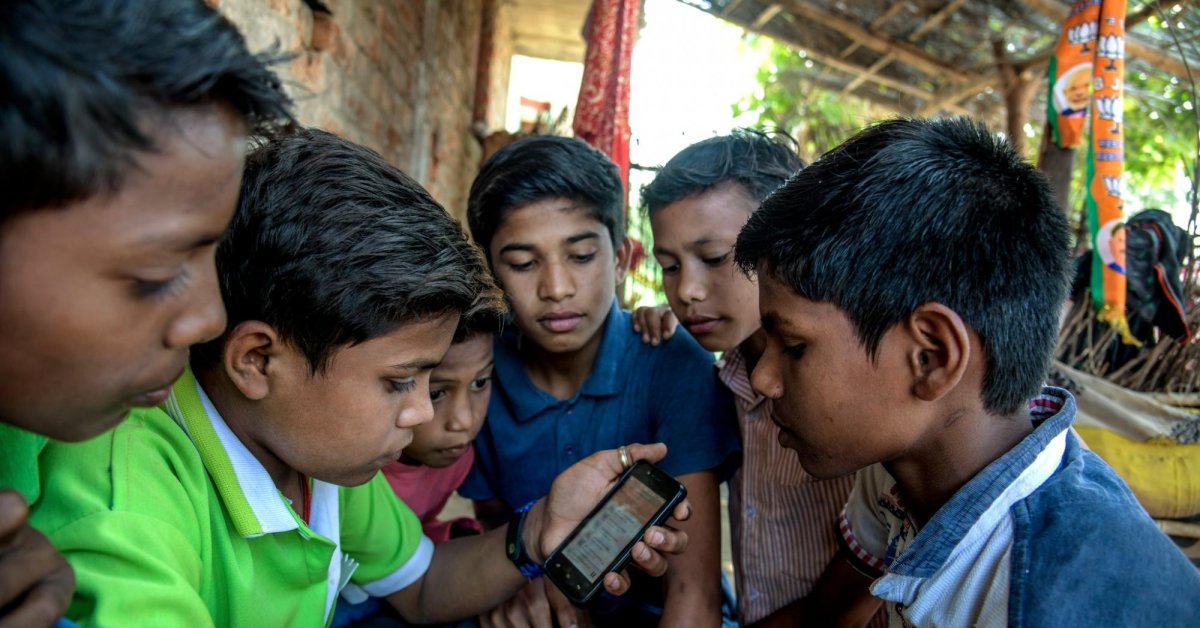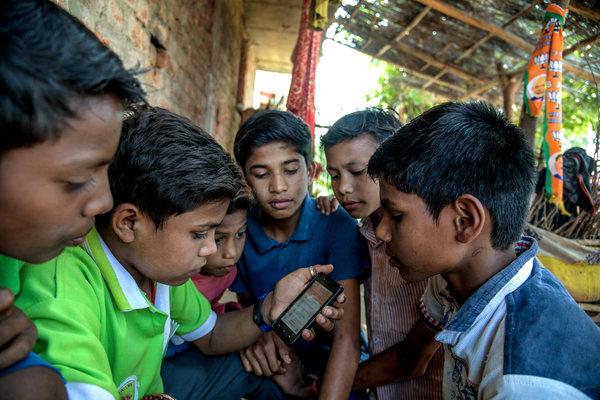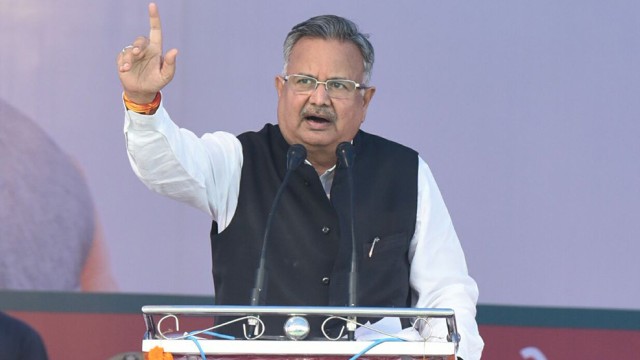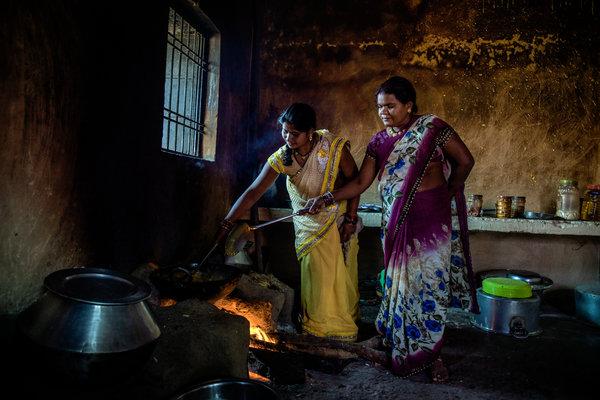In India’s Election, Free Phones Are Given To Residents In Exchange For Votes
Author - Nov 19, 2018

The Raman Singh's government is giving out free phones to residents in some remote areas and urging them to vote for his party.
- Delhi Is The World’s Most Polluted Capital City For Three Years In A Row
- Indian Farmers Install High-Tech, Night-Vision CCTV Cameras To Protect Themselves
- Looking For The Best Electric Bike In India 2021? Take A Look At These
In Chhattisgarh, India, the chief minister Raman Singh has his own way to lobby for the election. In particular, he promised to provide smartphones to every household, and his team is contacting voters with the government-issued phones, urging them to vote for Singh in an election that will conclude on Tuesday.

Chain Sahu, a cook at a Rajnandgaon school with two children, said she got her free phone last Sunday, right before her village’s voting date. Someone from the Raman government called her, asking if government programs benefited her and urging her to vote for Bharatiya Janata Party of Singh. She told that to her complaints about her salary and working conditions, the caller promised to carry her concerns to Singh.
The free phones are included in B.J.P.’s latest step in its campaign that controls state and national government as well as makes good use of social networks to influence voters. Singh’s Party in Rajasthan is also pouring money to data and free phone plans for residents and maybe for other states too.
The $71 million free-phone campaign in Chhattisgarh, whose English name is SKY, is meant to connect 26 million people in this state which includes 7,000 remote villages with no wireless data signal. According to the plan, there will be hundreds of mobile towers and phones will be given to college students and women so that they can access to the Internet, all following the goal “Digital India”.

Raman Singh
But among those 2.9 million that received free phones, some found themselves targeted by the Singh’s Party.
The B.J.P. has been paying 350 people in a government’s building to call residents who got free phones. The contractors read the words on a screen, asking about the phones and polling residents on their satisfaction with other Singh’s programs. Next, the callers ask if people intend to vote and who they want to vote for.
With the data collected, the Party sent activists to voters of its competitor, the Indian National Congress, or non-voters. A contractor said Singh’s Party is taking advantage of state property for personal benefits.
The phones also promote Singh, with his photo on the phone’s screen, displaying the nickname “Raman mobile”.
There are two apps on the phone, one for Mr. Singh and the other for prime minister Narendra Modi, both from the B.J.P. When users first launch the apps, they are asked for access to all contacts and personal information.
The Congress Party has submitted complaints to the Election Commission of India about B.J.P.’s action, saying that if one party has data of the phone users, other parties should have that too. The Congress Party also alleges B.J.P. of violating rules which ban on election work by the government.
On Saturday, Chhattisgarh’s chief electoral officer Subrat Sahoo said that it’s not illegal to use Magnum to call voters if the B.J.P. pays the bills, but New Delhi commission officials were investigating if the access given to the B.J.P. was improper.
In response, Chhattisgarh B.L.P.’s vice president Sunil Soni said the program was meant to help poor people in remote areas and urging people to vote is not wrong as Magnum and other entities were doing the same.
Magnum is an outsourcing company in India which conducts call-center work for both government agencies and private firms. The company is connected with Singh’s government as well as the free-phone campaign.
Back in September 2017, Magnum was hired by the state to ask residents about how satisfied they were with the government programs, the firm rented space in a state-owned building and launched a new call center for this work. Here, Mr. Singh conducted the first survey calls.
In July, the SKY campaign began, then Magnum was hired to take on customer service. At the same time, the state asked the firm to survey around 200,000 phone recipients to find out about the phones’ quality and services.
Two months ago, the state’s research stopped following India’s laws on pre-election which bans on using state resources to political purpose. Qadir Baksh, operation deputy manager at Magnum, said that right now, the company was making calls on behalf of the B.J.P. and the questions asked cannot be revealed.
In a phone interview, Chief executive Syed Adil Hussain at Magnum said that political activity was happening at the call center. He added that a client hired the center after the state’s survey ended. He did not know who the client was nor what they were doing as the deal was done by his boss.
From its research, the state says that the recipients are using free phones to call family members, surf the Internet and send texts on WhatsApp. However, last week, around a dozen users were interviewed, who said they hardly used the phones. They complained the phones had low battery life, low-quality apps and little free data per month.

In terms of Ms. Sahu mentioned at the beginning of this article, she said instead of giving useless phones, the government should have raised their daily wage, and provide gas stoves to schools so that they don’t have to cook with woods. She told that when receiving the call, she quickly answered: ‘You should raise our income or we will not vote.’
Featured Stories

Features - Jan 29, 2026
Permanently Deleting Your Instagram Account: A Complete Step-by-Step Tutorial

Features - Jul 01, 2025
What Are The Fastest Passenger Vehicles Ever Created?

Features - Jun 25, 2025
Japan Hydrogen Breakthrough: Scientists Crack the Clean Energy Code with...

ICT News - Jun 25, 2025
AI Intimidation Tactics: CEOs Turn Flawed Technology Into Employee Fear Machine

Review - Jun 25, 2025
Windows 11 Problems: Is Microsoft's "Best" OS Actually Getting Worse?

Features - Jun 22, 2025
Telegram Founder Pavel Durov Plans to Split $14 Billion Fortune Among 106 Children

ICT News - Jun 22, 2025
Neuralink Telepathy Chip Enables Quadriplegic Rob Greiner to Control Games with...

Features - Jun 21, 2025
This Over $100 Bottle Has Nothing But Fresh Air Inside

Features - Jun 18, 2025
Best Mobile VPN Apps for Gaming 2025: Complete Guide

Features - Jun 18, 2025
A Math Formula Tells Us How Long Everything Will Live
Read more

Mobile- Feb 17, 2026
Anticipating the Samsung Galaxy S26 and S26+: Key Rumors and Specs
The Samsung Galaxy S26 series is on the horizon, sparking excitement among tech enthusiasts.

ICT News- Feb 18, 2026
Google's Project Toscana: Elevating Pixel Face Unlock to Rival Apple's Face ID
As the smartphone landscape evolves, Google's push toward superior face unlock technology underscores its ambition to close the gap with Apple in user security and convenience.

ICT News- Feb 19, 2026
Escalating Costs for NVIDIA RTX 50 Series GPUs: RTX 5090 Tops $5,000, RTX 5060 Ti Closes in on RTX 5070 Pricing
As the RTX 50 series continues to push boundaries in gaming and AI, these price trends raise questions about accessibility for average gamers.

Mobile- Feb 16, 2026
Xiaomi Launches Affordable Tracker to Compete with Apple's AirTag
For users tired of ecosystem lock-in or high prices, the Xiaomi Tag represents a compelling, no-frills option that delivers core functionality at a fraction of the cost.
Comments
Sort by Newest | Popular